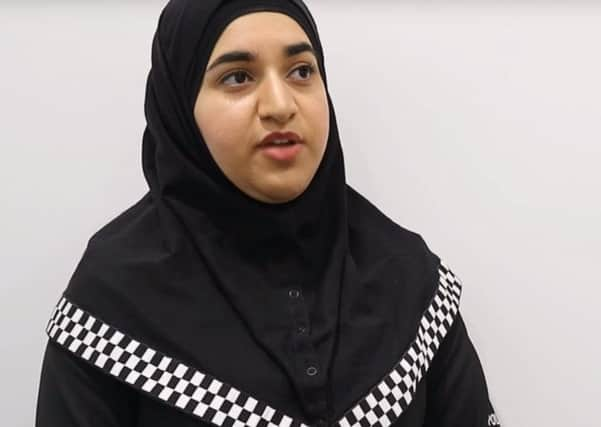Chris Marshall: Reaction to special constable in a hijab says a lot


A young Muslim, she became the first member of the national force to wear a specially designed hijab featuring the chequered Sillitoe tartan which has become a police symbol throughout the world.
The head covering was introduced in 2016 as part of a strategy to tackle the woeful under-representation of ethnic minorities in Scottish policing.
Advertisement
Hide AdAdvertisement
Hide AdIn a briefing given to the Scottish Police Authority (SPA) at that time, Police Scotland said it would need to recruit an additional 650 ethnic minority candidates to reflect the four per cent of those from black and Asian backgrounds in society as a whole, something it described as “unachievable”.
Despite noble intentions, the introduction of the hijab has failed to have the effect Police Scotland had hoped. To date, Aleena is the first and only person to wear it.
In order to understand why Muslims might be reluctant to join the police, you could start by looking at the online comments which accompany a social media post published last week.
Under a picture of the force’s first hijab-wearing recruit, a caption asks: “Considering a career as a police officer with Police Scotland? What’s holding you back?”
There follows dozens of racist and Islamophobic comments which are likely to help dissuade all but the most determined from pursuing a career in Scottish policing, never mind an unpaid position as a special constable.
Twitter isn’t reflective of the world at large – often it’s nothing more than an echo chamber for those who share the twin key characteristics of the troll: cowardice and hate.
And yet despite that (and the fact many of the comments appear not to come from Scots), the response is instructive.
We’re fond of telling ourselves that Scotland is a tolerant and inclusive place to live, and for the most part it is.
Advertisement
Hide AdAdvertisement
Hide AdBut we’re fooling ourselves if we believe that racism doesn’t exist and that sectarianism extends no further than Glasgow’s footballing divide.
Indeed, a new book argues that the idea Scotland is more welcoming than other parts of the UK is a “misleading fantasy”.
No Problem Here: Understanding Racism in Scotland claims black and minority ethnic applicants have a 1.1 per cent chance of being appointed by large public sector organisations, compared to 8.1 per cent for their white counterparts.
The book, which was edited by academics at Glasgow University, maintains that racism has been “less visible” in Scotland than in England due to lower numbers of black and Asian people migrating here after the Second World War.
Neil Davidson, a lecturer in sociology at the university and one of the book’s editors, told the BBC the idea of “Scottish exceptionalism” had helped fuel the idea the country is “culturally different” from England, with one of those differences being that “we are not racist and a lot of English people are”.
Having officers such as Aleena in Police Scotland is not about window dressing or PR, it’s about having the best possible police force we can, one that is representative of the communities it is there to serve.
Scotland’s first hijab-wearing special constable – described by her staff association as a “formidable and dedicated young woman” – deserves nothing but our admiration.
